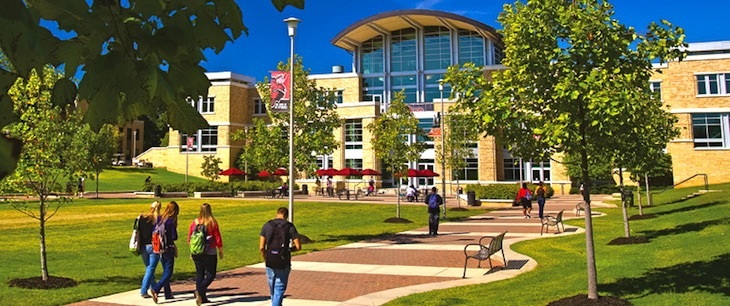Arkansas State University forms commission to study ambitious student retention goals
by September 26, 2017 5:39 pm 742 views

Only 37% of 2012 freshman students who began class at Arkansas State University graduated with a four-year degree in 2016.
ASU-Jonesboro Chancellor Kelly Damphousse has formed a 15-member Chancellor’s Commission on Completion to develop methods to retain and graduate a greater number of students he told Talk Business & Politics. Damphousse and Vice-Chancellor for Retention and Completion Dr. Jill Simmons will also serve on the commission. Simmons will be its chair.
“When we recruit students to ASU, we promise them a world-class education,” he said. “We have to improve our retention and graduation rates. We can do better.”
This year, 27% of the then-record 14,074 students who comprised the 2016 ASU freshman class didn’t return. An improved economy typically negatively impacts retention and graduation rates, but there are other factors not completely understood, ASU Vice-Chancellor for Marketing and Communications Dr. Bill Smith told Talk Business & Politics. Smith, a member of the Commission, said part of their job will be to interview students who didn’t come back, and determine the underlying factors that led them to leave the university.
Damphousse set aggressive goals for the university. By the fall of 2020 he wants to increase the freshman to sophomore retention rates from 72% to 85%. By 2023 he wants the graduation rate to grow by 8% to 45%, and two years later he hopes the graduation rate will balloon to 65%.
“These are audacious goals, but we owe it to our students, their parents, and the taxpayers of the state of Arkansas to make every effort to reach them,” Damphousse said.
The initial thrust of the campaign will be the compilation of data. Research in the subject will be studied and discussed, best practices at institutions nationwide will be considered, and local and national trends will be analyzed. Once the research is completed, the commission will begin to formulate policy and institutional changes needed to retain and graduate higher numbers of students, the chancellor said.
When asked by Talk Business & Politics why no students were appointed to the Commission, Damphousse said the rigid schedule planned would be an impairment to many student’s already busy academic schedules. He plans for the Commission to meet at least once a week.
The number of international students at ASU plummeted this year. The incoming international student population dropped 75% this fall. In 2016 the school had 124 first-year international students and it has declined to 34 this year. The trend mirrors a sharp decline in international students seeking an education in the U.S. International graduate student levels dropped 14.6%, to 245.
Administrators aren’t sure why international student numbers have dropped so severely, but several national studies have indicated the anti-immigrant policies under consideration by the federal government, including bans involving mostly-Muslim nations and the wall President Donald Trump has proposed along the U.S. southern border are factors, he said. It’s an issue, but 82% of ASU students are born in Arkansas, and most recruitment efforts will be in-state, he said. Damphousse does expect the international student decline to stop in the future.
“The American university experience is rich and unique in the world,” he said.
The system already has setup a special email address, [email protected]., to solicit ideas and information from students, faculty, community leaders, and others, Simmons said. A web site detailing the Commission’s progress will be launched in the near future, she said.
“Students that have any questions, or concerns, can email that address and we will respond by directing that need to the appropriate source on campus,” she said. “This is a one-stop place for students to reach out.”
Damphousse said he knows these are aggressive goals, with relatively short timelines, but it needs to be done. The Commission will begin its work in the coming weeks, and he hopes to have a firmer grip on why the system has been losing so many students from year one to year two.
“Student success is measured in many ways, but the ultimate measure of success is graduation,” he said.
